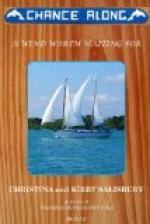Pierce made no answer. His face seemed fixed in a frown. His was a tragic past; he could not bear to think of it, much less could he speak of it. Noting that the oarsman appeared to be weary, Pierce volunteered to relieve him, an offer which was quickly accepted. As he seated himself and prepared to fall to work Laure advised him:
“Better count your money and see if it’s all there.”
He did as directed. “It’s all here,” he assured her.
She flashed him a smile, then crept into the place he had vacated and drew up the robe snugly. Pierce wondered why she eyed him with that peculiar intentness. Not until she had fallen asleep did he suspect with a guilty start that the robe was hers and that she had patiently waited for him to finish his sleep while she herself was drooping with fatigue. This suspicion gave him a disagreeable shock; he began to give some thought to the nature of his new surroundings. They were of a sort to warrant consideration; for a long time he rowed mechanically, a frown upon his brow.
In the first place, he was amazed to find how bravely he bore the anguish of a breaking heart, and how little he desired to do away with himself. The world, strangely enough, still remained a pleasant place, and already the fret for new adventure was stirring in him. He was not happy—thoughts of Hilda awoke real pain, and his sense of injury burned him like a brand— nevertheless, he could not make himself feel so utterly hopeless, so blackly despondent as the circumstances plainly warranted. He was, on the whole, agreeably surprised at his powers of resistance and of recuperation, both physical and emotional. For instance, he should by all means experience a wretched reaction from his inebriety; as a matter of fact, he had never felt better in his life; his head was clear, he was ravenously hungry. Then, too, he was not altogether hopeless; it seemed quite probable that he and Hilda would again meet, in which event there was no telling what might happen. Evidently liquor agreed with him; in his case it was not only an anodyne, but also a stimulus, spurring him to optimistic thought and independent action. Yes, whisky roused a fellow’s manhood. It must be so, otherwise he would never have summoned the strength to snap those chains which bound him to the Countess Courteau, or the reckless courage to embark upon an enterprise so foreign to his tastes and to his training as this one.
His memory of the later incidents of the night before was somewhat indistinct, as was his recollection of the scene when he had served his notice upon the Countess. Of this much he felt certain, however, he had done the right thing in freeing himself from a situation that reflected discredit upon his manhood. Whether he had acted wisely by casting in his lot with Morris Best’s outfit was another matter altogether. He was quite sure he had not acted wisely, but there is a satisfaction at certain times in doing what we know to be the wrong thing.




